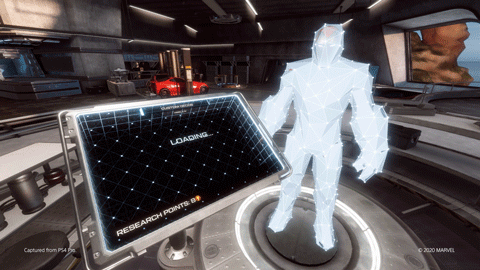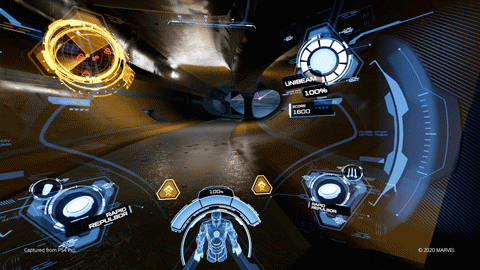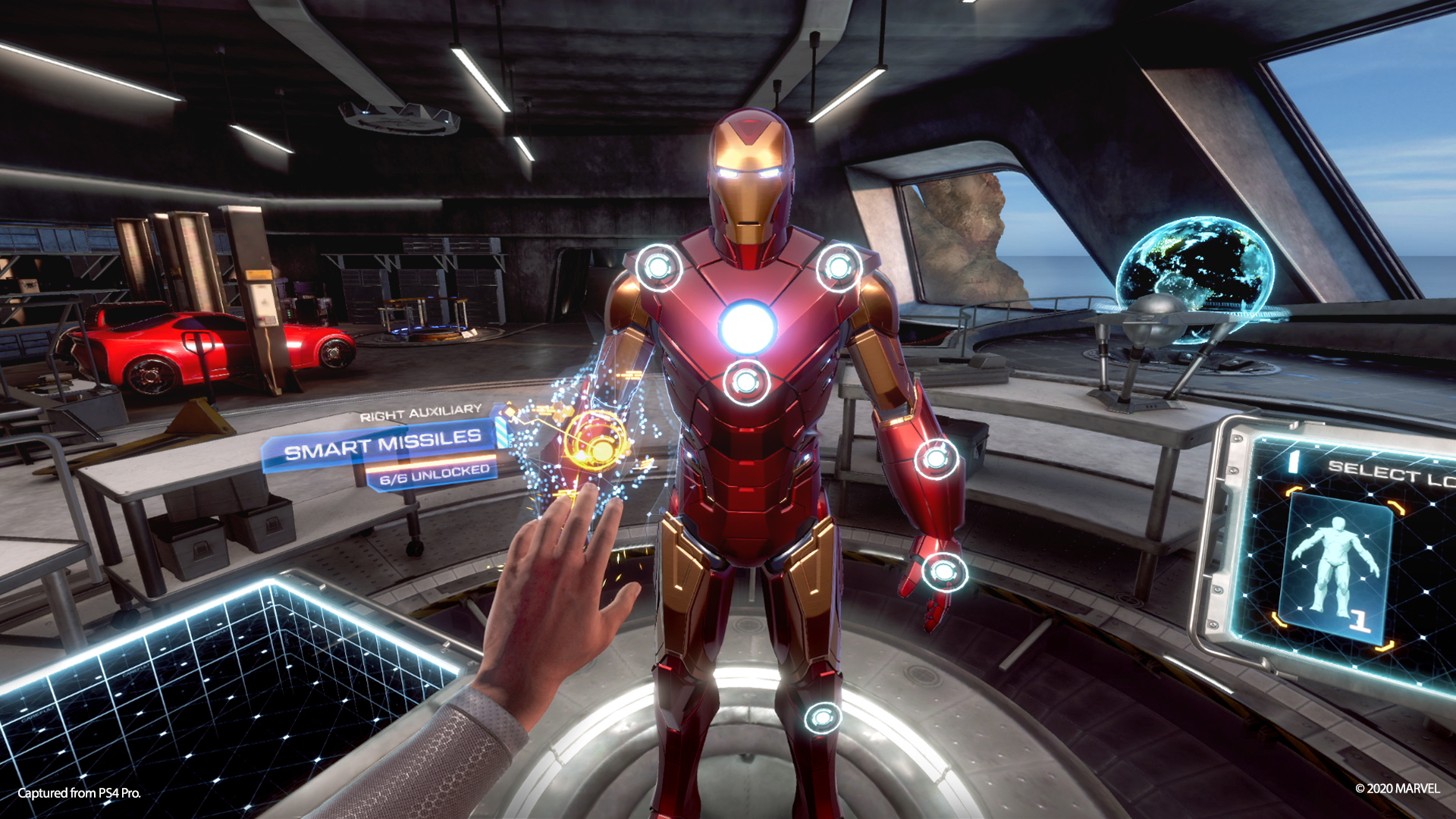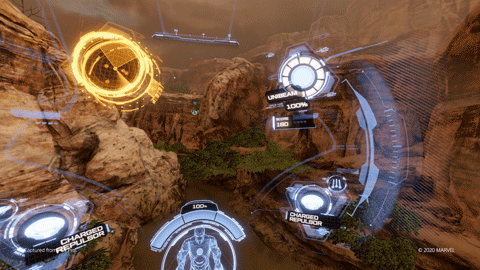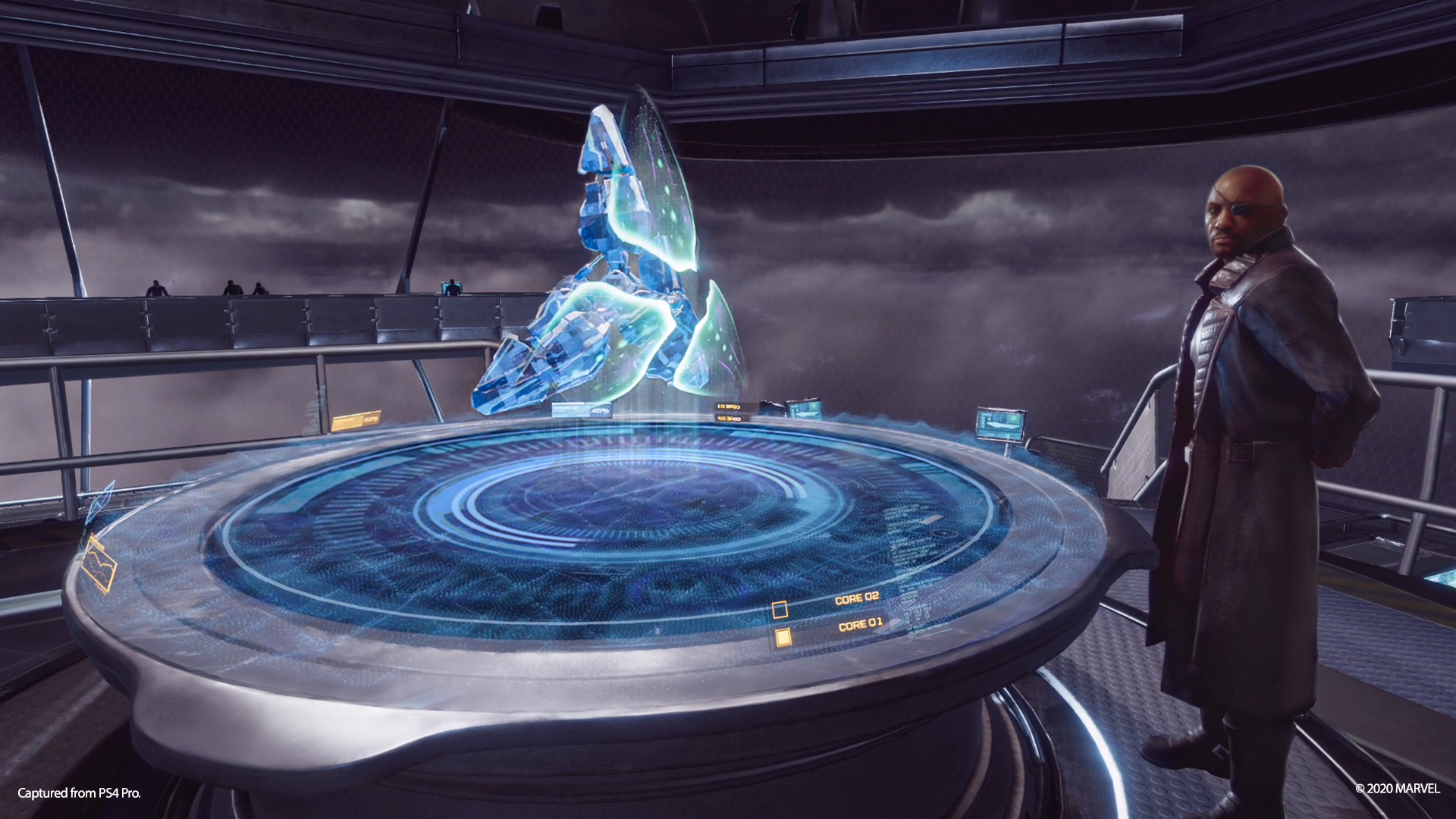I’m sitting in my private jet. Pepper’s mad. Maybe I shouldn’t have made her CEO of Stark Industries without talking to her about it first. Oh well, she’ll get over it. A jolt. The plane lurches. “Friday?” Suddenly there’s a hole where there used to be the side of the jet. Pepper and I are safely harnessed into our seats, but the case with my Iron Man armor is sucked out of the flaming opening. I undo my harness and leap. “Friday? Could use a hand here!” I’m falling through the air. I hold my right palm out in front of me as my gauntlet materializes nearby. Then the left. The chest piece thunks into place, and finally, the helmet. I Am Iron Man.
It’s a moment early on in Marvel’s Iron Man VR, the thrilling feeling of actually becoming a superhero in a way that I never have before. It was a powerful enough moment to nearly bring me to tears. I welled up with immense emotion, and then… a black screen. A loading bar. Before I could soar through the sky and rescue Pepper from the burning plane above me, I guess the suit had to… buffer, or something.
Let me get one thing clear: being Iron Man is thrilling. Iron Man VR captures the feeling of zipping around in the Iron Man suit, an impressive feat of immersion that wouldn’t be possible except in virtual reality. Iron Man VR is a highly demanding game with massive environments and fast movement. It’s a technological feat that developer Camouflaj had to work hard to achieve. Most VR games stick players in one spot as they move slowly from point to point. Iron Man is a lot more free with big levels to freely fly around in. While performance and visuals within the levels themselves are great, it does take a significant amount of loading to get there.
Marvel’s Iron Man VR Review – Mark I
As exhilarating as it is to be Iron Man, there is quite a learning curve. My first few flights felt like I was some kid who had stumbled into Tony Stark’s garage and taken his suit out for a ride. I tumbled through the air, smashed into walls, and shot wildly, missing my targets half the time. But learning comes with time and experimentation. Soon I became comfortable with extending my palms behind me, engaging the thrusters, and envisioning myself cruising through the air at top speeds. Once I put the “video game” out of my mind and really put myself in the armor, flight became a lot easier to handle. That’s always the hurdle in VR; embracing the full immersion it’s going for and overcoming the self-imposed limits of traditional video game conventions.
Combat is equally complicated, with numerous weapons that can be engaged using various buttons on the Move controllers, dependent on how you are holding your wrist. Repulsor blasts fire from your palms if your palms are up, and wrist-mounted auxiliary weapons activate if your fist is pointing down. Oh, and then there’s the rocket punch, which is exactly what it sounds like. Various upgrades can further modify both your flight and attacks. While I managed to get “better” over time, I still never felt entirely comfortable with the controls. I often frantically fired missiles when I intended to boost out of the way of an attack, or mistakenly activate hover mode when I intended to charge a rocket punch.
Over time, however, I managed to slowly learn how to utilize the tools at my disposal. Once I stopped trying to use everything at once, I was able to focus on mastering flight, combat, and the frantic moments of combining the two. There were still absolutely moments of sheer panic where I got myself turned around and was firing wildly at the various drones surrounding me, but there was a a real sense that I was actually getting the hang of using the Iron Man armor. I’m still far from beating the Camouflaj developer times on the various challenges in-game, but I’m at least not feeling like Tony’s awkward first test flights anymore. The moments of simply putting my palms down and zipping around a SHIELD Helicarrier felt like what VR was built for. I was a superhero.
Marvel’s Iron Man VR Review – Mark VII
On the other side of the Iron Man coin is Tony Stark, and Camouflaj captures this more human aspect of the Avenger as well, though perhaps not quite as eloquently. The Tony Stark segments are relegated to simple point-to-point scenarios with no free movement and very little interaction. In contrast to the free-flying moments being Iron Man, it was always a bit of a drag to go back to being Tony. Sure, the story being told is pretty cool, with some fun twists, turns, and surprises over the game’s 12 missions, but I always wished that being the egotistical billionaire genius was even half as enthralling as being in the armor.
The more dull and “basic VR game” Tony Stark segments are further accented by those long loading times. Perhaps if I was able to more quickly go from being Tony to Iron Man and back again, it wouldn’t have felt like such a chore to have to be Tony. Given the limitations of being outside of the suit and the load times it took to get to and from there—not to mention long loading times even between rooms or areas as Tony—the pacing of the Iron Man VR hits a lot of barriers that kill the flow.
There is a great and engaging story at the heart of everything, as well as some genuinely terrifying almost horror-level moments featuring the villain, Ghost, who’s hacking can offer a few surprises. Getting to meet Nick Fury on a SHIELD Helicarrier is exciting, and there are a number of other big moments I won’t spoil. But throughout, I always sighed miserably anytime another loading screen popped up. Especially because the Tony Stark scenes are typically vehicles for story moments between combat and flight, and are always bookended by lengthy load screens that left me standing awkwardly waiting.
Marvel’s Iron Man VR Review – Mark LXXXV
Marvel’s Iron Man VR requires two Move controllers and is best played standing up. The hand movements required for flight don’t support seated play all that well. There are numerous comfort options that can help mitigate VR sickness, including vignettes at various strengths and snap turns versus smooth turns. As with most VR games, the more comfort settings you have enabled, the less immersive the experience is. I disabled just about every comfort option, save for some light vignettes on turning and impact. The smooth turning option helped me much better handle flight, though I wished there was an option to use head turning instead of having to push the buttons. With so much else going on with the controller, using buttons to turn mid-flight made some of the more frantic combat situations difficult to deal with.
Players can upgrade the Iron Man armor with a few new weapons and abilities, but I never personally found that playing around with the different upgrades made a drastic difference in the frantic gameplay. Perhaps this is due to my own lack of expertise in fully mastering the art of flight and combat, but in the games most frantic moments, amidst a bunch of explosions and warnings that my suit integrity was critical, it never seemed to matter whether I had picked faster acceleration or higher top speed. Granted, I’d love to play around with it more, but loading back into Tony’s garage just to change a couple things sounds like a few too many loading screens I don’t want to sit through.
While it will probably only take around six to eight hours to beat Iron Man VR’s campaign (load times included), there’s plenty of additional replay value to keep you coming back for more. Ratings on each level challenge players to perform even better, and a bunch of optional flight and combat challenges will test players’ abilities to really become Iron Man. Again, the biggest downside to this replayability was load times that tended to make playing the various missions and challenges a lengthy chore. It was a theme that I couldn’t escape throughout my entire time with Marvel’s Iron Man VR, just like Tony has trouble escaping his weapons-manufacturing past.
Marvel’s Iron Man VR is two distinct games separated by long load times. There’s the thrilling and immersive Iron Man side of the game, letting players actually become the superhero in a way they never have before. And then there are the more sluggish Tony Stark moments, saddled with basic point-to-point VR teleportation movement as a channel to deliver story moments to the player. Don’t get me wrong. I loved being Iron Man. Camouflaj achieved that true superhero feeling when you’re flying high above the earth. Marvel’s Iron Man VR has a strong iron heart, it feels like they are squeezing all they can from the tech, but PSVR inherently anchors the experience with technical limitations that repeatedly interrupt the immersion with yet another loading bar.
Marvel’s Iron Man VR review code provided by publisher. Reviewed on a standard launch PlayStation 4. For more information on scoring, please read our Review Policy.
-
The immersive experience of being Iron Man is unlike any other
-
Engaging story with plenty of twists, turns, and surprises
-
Lots of replayability and challenge
-
So many long loading screens that interrupt the immersion
-
Sluggish Tony Stark segments with point-to-point teleportation
-
Huge learning curve to master the complexities of flight and combat
